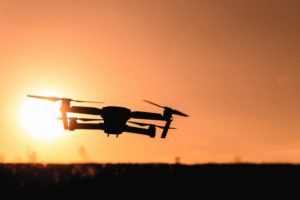When Qualcomm unveiled its new drone development platform, the company tried to place most of the attention on the more consumer-friendly applications of the technology. Representatives eagerly explained how the next generation of drones would help Hollywood make better films, or help retailers bring packages to our doors more quickly, giving everyday civilians more reason to be excited about the impending drone reality.

“5G and AI is going to accelerate development of commercial enterprise industrial drones and open up innovative possibilities for industries looking to adopt high-performance, low power, long-range, and intelligent drones,” said Qualcomm Autonomous Robots GM Dev Singh, in an interview with VentureBeat. “We’re seeing a significant interest because the drone use cases are now going beyond hobby and commercial to the enterprise.”
However, Singh’s enthusiasm seems to gloss over some of the more controversial applications of drone technology. While drones do have socially beneficial applications, many of the headlines in recent years have been devoted to more invasive surveillance and security projects. For example, US Customs and Border Protection has trialed patrol drones at the country’s Southern border, and the town of Westport, Connecticut, scrapped a plan to use surveillance drones to watch for signs of COVID-19 in response to intense public backlash.
Those kinds of headlines have understandably drawn the ire of privacy advocates, who have argued that drones represent an even greater threat than CCTV cameras. After all, a mounted security camera only covers a limited area and cannot follow you home. A drone, on the other hand, has the ability to go where more conventional cameras cannot, making them a potential disaster from a privacy standpoint. In Westport, for instance, residents were worried that the drones would be used to spy on them in their own backyards, and that they would not even realize that a robot was collecting their personal health information.
That has obvious implications for everyday civilians, so how worried should the rest of us be when the governments and the corporations start to send in the drones?
The Greater Good
When you cut through the fearmongering (and the hype) one thing becomes clear: Qualcomm’s enthusiasm is absolutely justified. Drone technology could be a major boon in many industries, in a way that brings tangible benefits to the rest of society. Much of that stems from the fact that you can cover far more ground with a drone than you can manually.
That will have an immediate impact in the industrial, agricultural, and public works sectors. It’s much easier to inspect a bridge with a drone than it is to send someone up a ladder, and the upside becomes even more evident when the drone is outfitted with AI tech. For example, a computer vision algorithm can be trained to search for structural flaws, giving operators a better chance to spot (and address) problems in a much more timely fashion.
We’re already starting to see some of that utility in practice, most notably in the agricultural sector, where drones are being used to track the health of plants growing in the field, and to accelerate agricultural research. The School of Integrative Plant Science is currently using computer vision to watch for mildew fungus, and that data will inform the development of crops that will be resistant to the disease.
That same model can be applied to projects in virtually any industry. Drones give people access to vast amounts of high quality information, and automate tasks that were once carried out by hand. There’s no telling what that will lead to if the information is put to good use.
Skynet is Watching
The human advantages of drone technology are very real. The fact nevertheless remains that the surveillance sector is likely to be lucrative for drone manufacturers, especially if governments continue to express interest in the technology. That means that privacy questions will keep cropping up as the technology becomes more ubiquitous.

Unfortunately, drone development seems to be outpacing the answers to those questions. As is often the case with new and innovative technologies, the regulatory environment is still emerging, and lawmakers will ultimately have a major say about what is and is not permissible for governments and corporate entities that end up deploying drones.
Having said that, we do have a few clues about what that environment could look like. The backlash to facial recognition has increased in the past few years, and many legislatures are already banning the public use of face-based surveillance systems. It stands to reason that those bans would extend to drones outfitted with facial recognition cameras.
Those kinds of measures should help assuage the fears of the general public, but that alone may not be sufficient. Any connected and camera-ready device is a potential surveillance tool. Even legitimate augmented reality smartphone apps could capture and identify bystanders without their consent. Drones would further compound that problem, increasing the number of connected devices and making it almost impossible to escape surveillance in a public space.
At the end of the day, those privacy concerns are not unique to drones. That means that the drone ecosystem will gain greater focus as those other debates get settled. For now, it’s enough to note that the technology is not inherently problematic, and that it’s important to remain vigilant to make sure that drones work for, rather than against, the greater good.

Follow Us